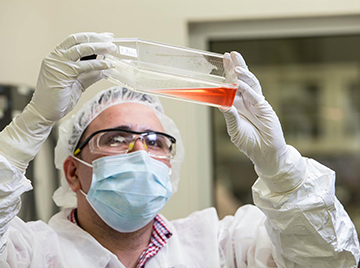Infectious Disease
"There is so much more to be done; patients are waiting"
Dr Paul Janssen
Introduction
At Janssen we have ambitious goals. To prevent, cure and one day eradicate infectious diseases. It’s a goal we’ve been working toward from our earliest days. Our company’s founder, Dr Paul Janssen, relentlessly pursued solutions to the diseases that threaten humanity, particularly HIV/AIDS.
Today we continue to improve public health by fighting infectious diseases worldwide. Our treatments have helped to transform the lives of people living with HIV/AIDS, hepatitis C and tuberculosis. Success has come through constant innovation and research. But treatments alone are not enough. That’s why we’re working with the doctors, nurses and advocates on the front line to provide a portfolio of solutions.
World demand for antibiotics remains high due to escalating resistance and the increased risk of serious infections in both immune-suppressed patients and ageing populations. Our goal is to transform people’s lives and to improve public health by fighting infectious diseases worldwide.
To that end we are leveraging solid foundations in science and innovative thinking to bring break-through solutions to key unmet medical needs such as:
Tuberculosis (TB)
What is tuberculosis?
Tuberculosis is an infection caused by a bacterium called Mycobacterium tuberculosis.
TB most commonly affects the lungs (pulmonary TB) although it can affect any part of the body including the kidneys, brain or bone (extra pulmonary TB).
How common is tuberculosis?
The bacteria that cause TB are usually spread through the air, for example when an infected person coughs or sneezes. However, only some people with pulmonary TB are infectious to others, these cases are known as sputum smear positive (or open TB).
Anyone can get TB, however it is more common in people who live in overcrowding conditions or who are malnourished.
The following people are also at a higher risk of contracting TB:
- People with conditions such as HIV or diabetes
- People with weakened immune systems (such as young children and the elderly or people taking drugs that weaken the immune system)
- Smokers or those who are dependent upon drugs or alcohol
TB is not very common in developed countries, although some countries have seen an increase in the number of cases.
However, TB is very common in many developing countries, partly due to living conditions and high prevalence of HIV.
- Persistent cough (lasting for weeks)
- Fever
- Unexplained weight loss
- Night sweats
- Blood in your sputum (phlegm or spit)
- Fatigue (tiredness)
- Chest pains

